Related Research Articles
The history of Moldova spans prehistoric cultures,ancient and medieval empires,and periods of foreign rule and modern independence.

The Moldavian Soviet Socialist Republic or Moldavian SSR,also known as the Moldovan Soviet Socialist Republic,Moldovan SSR,Soviet Moldavia,Soviet Moldova,or simply Moldavia or Moldova,was one of the 15 republics of the Soviet Union which existed from 1940 to 1991. The republic was formed on 2 August 1940 from parts of Bessarabia,a region annexed from Romania on 28 June of that year,and parts of the Moldavian Autonomous Soviet Socialist Republic,an autonomous Soviet republic within the Ukrainian SSR.

Vladimir Voronin is a Moldovan politician. He was the third President of Moldova from 2001 until 2009 and has been the leader of the Party of Communists of Moldova (PCRM) since 1994. He was Europe's first democratically elected communist party head of state after the dissolution of the Eastern Bloc.

The Party of Communists of the Republic of Moldova is a communist party in Moldova led by Vladimir Voronin. It is the only communist party to have held a majority government in a post-Soviet state. It has been variously described as communist,Moldovenist,populist,Russophile,and pro-Soviet.

Mircea Snegur was a Moldovan agronomist and politician who served as the first President of Moldova from 1990 to 1997. Prior to that,he served as the Chairman of the Presidium of the Supreme Soviet of the Moldavian SSR from 1989 to 1990 and chairman of the Supreme Soviet from 27 April to 3 September 1990.

Petru Lucinschi is a former Moldovan politician who was Moldova's second President from 1997 to 2001. He currently serves as the founder and head of the Lucinschi Foundation of Strategic Studies and International Relations.

Moldovans,sometimes referred to as Moldavians,are the ethnic group native to the Moldova,who mostly speak the Romanian language,locally referred also as Moldovan. 75.1% of the Moldovan population declared Moldovan ethnicity in the 2014 Moldovan census,and Moldovans form significant communities in Romania,Italy,Ukraine and Russia.
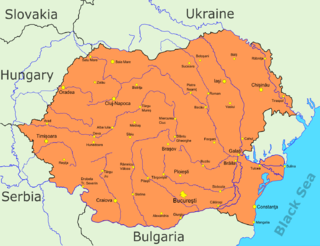
The unification of Moldova and Romania is a popular concept and hypothetical unification in the two countries that began during the Revolutions of 1989. The Romanian Revolution in 1989 and the independence of Moldova in 1991 further contributed to the development of a movement for the unification of the two Romanian-speaking countries. The question of reunification is recurrent in the public sphere of the two countries,often as a speculation,both as a goal and a danger. Though historically Romanian support for unification was high,a March 2022 survey following the Russian invasion of Ukraine indicated that only 11% of Romania's population supports an immediate union,while over 42% think it is not the right moment.
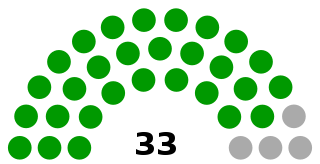
The Supreme Council of the Pridnestrovian Moldavian Republic is the unicameral legislature of the internationally-unrecognised state of Transnistria. It consists of 33 seats,all of which are determined by single mandate constituencies and is headed by a chairman.

Moldovenism is a term used to describe the political support and promotion of a Moldovan identity and culture,including a Moldovan language,independent from those of any other ethnic group,the Romanians in particular. It is primarily used as a pejorative by the opponents of such ideas as part of the wider controversy over ethnic and linguistic identity in Moldova.
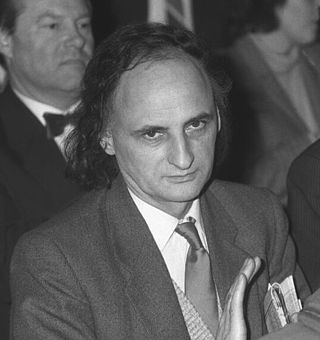
Grigore Vieru was a Moldovan poet,writer and unionist advocate,known for his poems and books for children. His poetry is characterized by vivid natural scenery,patriotism,as well as a venerated image of the sacred mother. Vieru wrote in the Romanian language. In 1993 he was elected a correspondent member of the Romanian Academy.
The Communist Party of Estonia (CPSU) (Estonian:Eestimaa Kommunistlik Partei;Russian:КоммунистическаяпартияЭстонии,romanized: Kommunisticheskaya partiya Estonii) was a political party in Estonia. The party was initially known as Communist Party of Estonia (on CPSU platform) (EKP (NLKP platvormil)),and was formed in 1990 through a split in the original Communist Party of Estonia (EKP). The split occurred at the 20th congress of EKP in March 1990,as a reaction against the decision of the congress to separate EKP from the Communist Party of the Soviet Union and rebrand itself into the Estonian Democratic Labour Party (EDTP). Immediately after the independence decision of EKP,the pro-Soviet delegates left the congress venue. The convened their own rival 20th congress on March 26,1990. EKP (NLKP platvormil) elected its own Central Committee,headed by its First Secretary Alexander Gusev,and would function as a separate party from EKP.

Mihai Ghimpu is a Moldovan politician who served as President of the Moldovan Parliament and Acting President of Moldova from 2009 to 2010. He was member of Parliament of Moldova from 1990 to 1998 and from 2009 to 2019. Ghimpu held the position of leader of Liberal Party (PL) from 1998 to 2018.

The Agrarian Party of Moldova,formerly the Democratic Agrarian Party of Moldova,is a Moldovan political party that was prominent from 1991 to 1998. Governing for most of this period,the party represented a large centrist multi-ethnic bloc led by former collective farm chairmen and village mayors. These reformed Communists were motivated more by patronage than ideology and committed to maintaining their positions of power in the privatised agricultural and agro-industrial sector. To its right stood the pan-Romanians of the Popular Front,and to its left,the Socialists and later the Communists.

Marian Lupu is a Moldovan economist and politician who was the President of the Parliament of Moldova between 2010 and 2013. From this position he served as Acting President of Moldova from 2010 until 2012.

The Party of Socialists of the Republic of Moldova is a democratic socialist political party in Moldova. A populist party,it holds Eurosceptic and Russophilic views,both of which are reflected by its long-time leader and former Moldovan president Igor Dodon. It is contrasted to like-minded centre-left European parties for its conservative views on social issues,reflecting the country's strong social conservatism and the influence of the Moldovan Orthodox Church.

Ivan Ivanovich Bodiul was a Soviet and Moldovan politician prominent in the Moldavian SSR,particularly during the Brezhnev era.
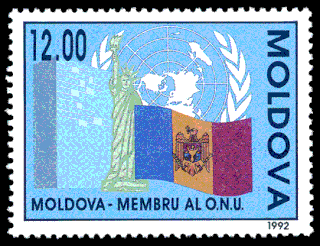
The following is timeline of the History of independent Moldova which started after the independence of Moldova.
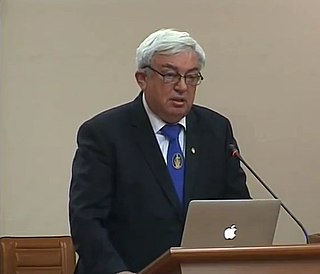
Gheorghe Duca is a Moldovan academic and politician who is a former president of the Academy of Sciences of Moldova,an honorary member of the Romanian Academy,and former Moldovan Minister of Environment,Public Works and Regional Development.

Andrei Eșanu is a historian,writer and researcher from the Republic of Moldova. He is a member of the Commission for the Study of the Communist Dictatorship in Moldova. He is part of the Academy of Sciences of Moldova,and was elected an honorary member of the Romanian Academy in 2011.
References
- ↑ Georgescu, Mircea (1994). Singur printre ambasadori (in Romanian). S.C. Esperance Impex S.R.L. p. 342. ISBN 978-973-0-00126-6 . Retrieved 3 January 2025.
- ↑ Советская Молдавия--краткая энциклопедия (in Russian). Глав. ред. Молдавской Сов. энциклопедии. 1982. p. 191. Retrieved 3 January 2025.
- ↑ Izvestii͡a T͡SK KPSS (in Russian). Izd. T͡Sentralʹnogo komiteta KPSS. 1991. p. 118. Retrieved 3 January 2025.
- ↑ "DECRET Nr. 187 din 01-06-1994". www.legis.md. Retrieved 3 January 2025.
- ↑ "УКАЗ № 21 от 22-04-2005". www.legis.md. Retrieved 3 January 2025.